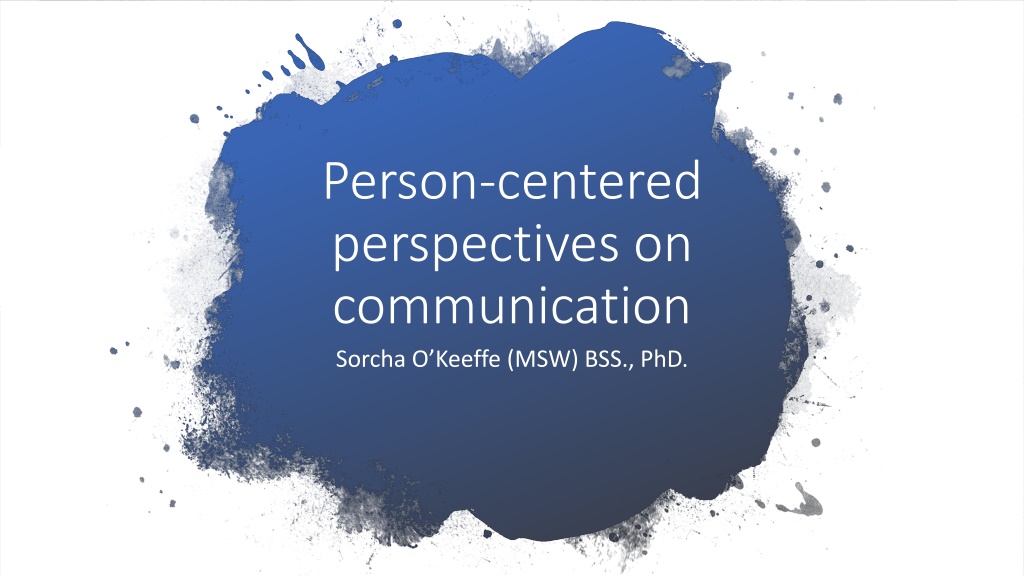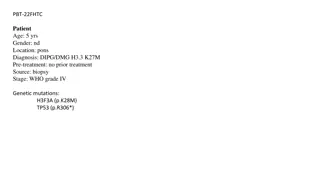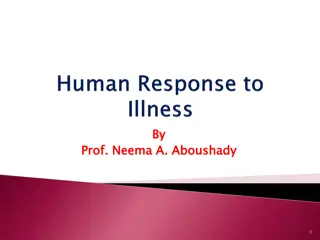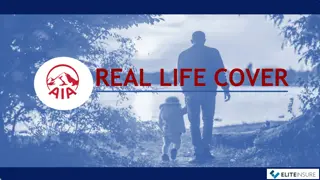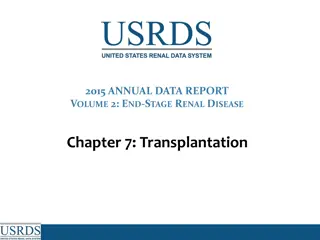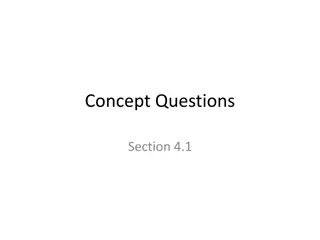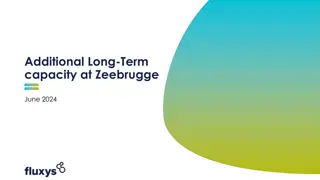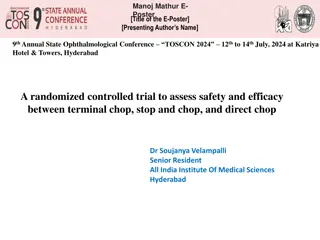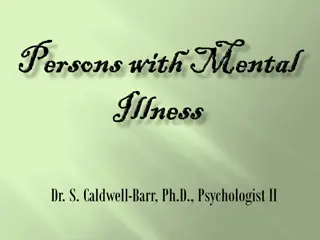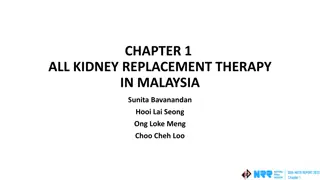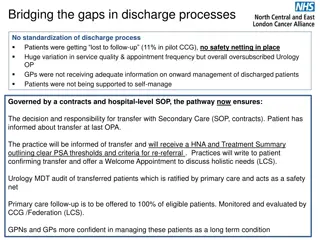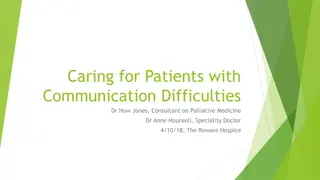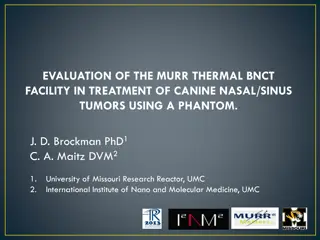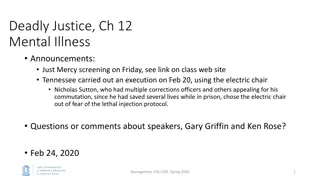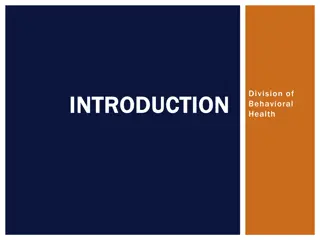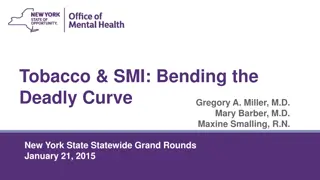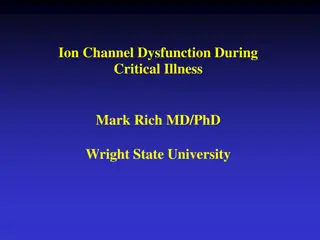Understanding Communication in Terminal Illness: Insights from Glioma Patients
Sorcha O'Keeffe's research delves into the communication experiences of individuals diagnosed with glioma, a malignant brain tumor with a poor prognosis. The study explores how patients cope and prioritize hope, emphasizing the importance of creating a tolerable reality amidst uncertainty. Communication challenges, adaptation to illness, and the role of palliative care services are highlighted, showcasing the varying levels of awareness among patients facing terminal diagnoses.
Download Presentation

Please find below an Image/Link to download the presentation.
The content on the website is provided AS IS for your information and personal use only. It may not be sold, licensed, or shared on other websites without obtaining consent from the author. Download presentation by click this link. If you encounter any issues during the download, it is possible that the publisher has removed the file from their server.
E N D
Presentation Transcript
Person-centered perspectives on communication Sorcha O Keeffe (MSW) BSS., PhD.
Based on findings from a larger doctoral study Understanding the experiences of people with glioma people What should we tell patients with life- threatening illnesses? Brief overview of the study Outline patients experiences of receiving serious diagnoses and how that impacted their illness journey Recommendations for practice. Introduction S O'Keeffe 2019
Glioma (malignant brain tumour) Poor prognosis - approx 18months The study set out to understand; The experiences of those with glioma What is most important to them? How do people cope and function on a daily basis? Interviewed 16 people with a recent diagnosis Qualitative study Saturation of data achieved at this point 3 points across the early stages of treatment Start of radiotherapy (4/5 weeks post dx) End of radiotherapy (10 weeks post dx) 3-4 months after radiotherapy completed (6 months post dx) Study overview S O'Keeffe 2019
People with glioma (and other terminal diagnoses) prioritise finding ways to live daily life to the best of their ability This is achieved by creating, maintaining and protecting hope In order to hope they have to be able to cope (adjust and adapt, achieve emotional well-being) In order to cope they control and reconstruct their thoughts and create a tolerable reality to live in. A tolerable reality was created by focusing on the uncertainty of their future. They reconstructed uncertainty as a positive. Uncertainty left room for positive possibilities, the possibility of a better outcome, which fostered hope. Each person was aware of the difficult facts of the diagnosis but did not necessarily want to admit/speak about it. Findings of the study S O'Keeffe 2019
Communication S O'Keeffe 2019
Awareness seemed to vary among patients They doesn t seem to have insight Advanced care planning/future planning Literature highlights much dissatisfaction with communication Adaptation and adjustment to illness Having hope Access to timely palliative care services Would you want to know? What would you like to be told? Why is communication so important? S O'Keeffe 2019
Receiving the diagnosis it s stage four. So at that I was like, Okay that s not good. Stage four of anything is not good. So he says, You ll be needing radiation and chemo and a lot of it and it s an aggressive tumour and it possibly will grow back again. So tears started and it was a bit stressful that day to say the least. I suppose they re so black and white about it, which they have to be, they have to tell you as it is, but for us it was, God, now what? About half an hour of tissues and tears. So then trying to get our heads round it then I suppose. They were very good, they sat on and they didn t rush me or anything like that, but it s still hard to get your head round because it had been so quick and out of the blue. Aoife, age 51 S O'Keeffe 2019
Receiving the diagnosis Most people attended the meeting themselves Disclosure of the prognosis varied from case to case. They received varying levels of information based on their own preferences and that of the doctor. Many participants accepted the basic information they were given and did not request additional information. Some participants received information pertaining to the difficult facts of their diagnosis without requesting them. The few who did attempt to develop a more accurate picture of their prognosis were informed that everyone is different, and the doctor usually double- checked that the person was sure they really wanted to know. Participants appreciated this response, sometimes opting not to receive the information. S O'Keeffe 2019
They actually didnt give you any hope. No cure for this. Category four and there is no cure. (Tom) it s very easy to be completely deflated leaving that room. You think you re not going to see tomorrow and I know doctors can t give you hope because they can t, they can t because they don t know and it s different ( ) if there s a way that [patients] canfeel that they re not completely isolated, they have this devastating disease and they walk out the room and they feel like they re being hit with an avalanche ( ) Look, we ll get through this together, I will see you in two weeks. You re not giving them promises, you re not giving them hope, you re not changing your story, but you re saying in some way there s somebody else there, I ll see you in two weeks. We ll step through this together ... (Ursula) S O'Keeffe 2019 Feeling hopeless and alone after disclosure
Honest communication They considered honest communication during diagnosis disclosure essential. They appreciated knowing what the doctors were thinking, knowing that the team weren t trying to protect them by hiding anything from them If I thought they were trying to hide something from me, I d be really worried. So at least they come up and say, This is what it is and this is what we re going to try and do. Sarah, age 35 Honesty did not always include the full picture Participants unanimously reported that they did not want to be protected, lied to, or placated into a false reality. The main difference in communication preferences differed was the extent of information that people actually wanted. S O'Keeffe 2019
Those who expressed no awareness of the likely outcome of their disease (death) and did not express concern of a limited future or a threat to life (n=3). Those who displayed some awareness of the threat to life (n=6) which was either expressed explicitly (references to threat to life) or displayed covertly i.e. closed awareness (e.g. requesting not to know the details of the diagnosis). Those who knew and openly expressed awareness of the threat to their lives and the likely outcome of their diagnosis (n=4). Those who knew and sought additional information regarding their disease, (e.g. an exact timeline for survival or the manner in which they would die)(n=3). Awareness changed over time and as they developed perceptions of how their body was reacting to treatment. Those who chose to know the facts relating to their diagnosis identified as proactive individuals who typically preferred to plan for the future and wanted to acquire information so that they would know what to expect. Those who chose not to know believed they would be no benefit to knowing. Awareness of the implications of the diagnosis S O'Keeffe 2019
Choosing not to know Aoife changed her mind about wanting to know; My son wanted me to ask about prognosis. I didn t really want to. So I did ask and he [the doctor]goes, Do you really want to know? Not really. He said, Then I won t tell you. I don t work on that kind of statistics anyway. I like to see how we go. We ll talk today and half way through the treatment we ll talk again , and he says again But I can certainly tell you if you want to know. Not particularly. My son was annoyed-, I says, No, it s me. If I want to know I ll ask. You can just wait. Ian requested his family receive the diagnosis rather than him; [Family] needed to, they needed to know what exactly what I was facing into, wherever, wherever that leads, for me it wasn t so much I would just prefer the basic as possible- so I could ask, what s the plan, what are you gonna do, and that s all, I don t need anything after that. Joan didn t want to know until she needed to know; I don t particularly want to know, unless something drastic happens and I think, Right, I m going to need to know. Now, is there things I need to put in place? S O'Keeffe 2019
Choosing not to know Based on multiple meetings at various points across the treatment trajectory it was apparent that each participant, regardless of their expressed level of awareness or insight, was undoubtedly aware of the serious threat to life and the likely deterioration of their health in the near future. For example, participants who spoke about intending to be cured or those who did not worry about the diagnosis displayed their awareness through accounts of sleepless nights, fear, or avoidance of prognostic information. Declining doctors offers for more information regarding their prognosis suggests that although they may not discuss their awareness, their actions and decisions indicate some awareness of the severity of their situation. These responses indicate that the person is aware that a decline in health is likely, however, for reasons related to their need to emotionally survive, participants chose not to speak about the likely outcome of their disease. S O'Keeffe 2019
The participants controlled the amount of information they received in order to maintain uncertainty, so that they could protect their ability to hope and cope. When given the option to obtain certainty through education, support groups and counselling, this patient- group declined. Patients preferred to access information through their selves i.e. how their body s were feeling throughout treatment, rather than access external information. Hope and uncertainty S O'Keeffe 2019
Its hard when [friends] ask questions [about prognosis] cause you re like, I ve no idea . I don t want to know like even if there was statistics I don t think I d want to know them, like I just think I know how I'm feeling myself, and if I continue to feel this way then I ll be fine. And that s what [doctor] said, she was like it s kind of gauged on how I feel so like if I'm feeling good after I'm finished treatment, and everything keeps going good, then like it kind of indicates that we could get a good scan. So, like I know if I'm feeling fine then I will be fine. And saying that if I don t feel fine like obviously there s other things we can do so, I'm not going to freak out about it but I'm just kind of going off that and just, just taking it like a day at a time. Rachel Hope and uncertainty S O'Keeffe 2019
meeting familiar staff attributed their ability to cope during this time to the staff and the hospital. their doctor s manner and style of communication the sense of organisation for the diagnosis disclosure meeting. ...being given an opportunity to change their mind about their information preference ...hearing that everyone s case is different Worked hard to individualise themselves, to be different, hope they may beat the odds Patients appreciated S O'Keeffe 2019
I asked him straight, what way am I going to be. I said, Can I die from it? I asked him and he said, Well, you could die from it. You could live for three months, six months, he said, You don t think about things like that you have to think about how you could get on. He said my attitude was very good. He said he d never seen an attitude like mine. So at least that kind of helped me. If you take away hope from anybody you destroy them and basically the fact that he has said ( ) the ways things are going. We don t know, we can t tell you. The way you re taking all this in and the way you re going through your treatment is brilliant. Jennifer Positive interactions we were having the chat about it and, no problem, if it was serious I know he [the consultant]wouldn t be laughing, whereas on Thursday it was a lovely conversation and I had a bit of a laugh with him, he is absolutely brilliant Liam S O'Keeffe 2019
Conclusions Receiving honest communication in a sensitive manner empowered participants and engendered a sense of respect and appreciation for their capacity as an individual. The participants did not want to be patronised, rather they wanted to be afforded the respect and dignity associated with honest communication. Despite the upsetting nature of the communication, I argue that a number of the participants would choose to forgo the option of being given hope in favour of the option of honesty, if being provided with hope threatened their dignity. The study illuminated the need for communication to be conducted carefully and in an individualised, case-by-case manner, while appreciating patients agency and their ability to protect themselves from threats to their ability to cope. The findings of this study portrayed people s immense capacity to build hope for themselves from one of the most devastating illnesses. Such an ability should be understood and afforded to the patient group. S O'Keeffe 2019
Translating the findings into practice Participants knew they were going to receive bad news when they were brought into a private room, especially when joined by a nurse. When operating in such an emotive context, professionals must observe the thin line between leaving room for the person to create hope and offering false hope. Participants sought hope from any source available. Constructing their own hope based on false hope may prove devastating when reality is revealed or discovered. Healthcare professionals should leave room for the construction of hope through uncertainty, while prioritising honest communication. Ascertain how much information the person wants. Double-check if the patient truly wants the information. Revisit this decision at multiple time-points, rather than considering this as a one-off communication episode Each participant, regardless of how much they knew about their illness, was successfully able to create hope in some sense. S O'Keeffe 2019
Thank you! sorchaokeeffe@beaumont.ie S O'Keeffe 2019
